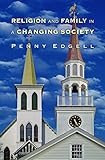Religion and family in a changing society / Penny Edgell.
Material type: TextSeries: Princeton studies in cultural sociologyPublisher: Princeton, N.J. : Princeton University Press, [2006]Copyright date: ©2006Description: 1 online resource (xii, 210 pages)Content type:
TextSeries: Princeton studies in cultural sociologyPublisher: Princeton, N.J. : Princeton University Press, [2006]Copyright date: ©2006Description: 1 online resource (xii, 210 pages)Content type: - text
- computer
- online resource
- 9781400850761
- 1400850762
- Families -- Religious life -- New York (State)
- Church work with families -- New York (State)
- New York (State) -- Religious life and customs
- Familles -- Vie religieuse -- New York (État)
- Pastorale familiale -- New York (État)
- New York (État) -- Vie religieuse
- POLITICAL SCIENCE -- Public Policy -- Cultural Policy
- SOCIAL SCIENCE -- Anthropology -- Cultural
- SOCIAL SCIENCE -- Popular Culture
- SOCIAL SCIENCE -- Sociology of Religion
- Church work with families
- Families -- Religious life
- New York (State)
- Anpassung
- Familienleben
- Religionsgemeinschaft
- USA
- 306.6/09747 22
- BV4526.3 .E33 2006eb
| Item type | Home library | Collection | Call number | Materials specified | Status | Date due | Barcode | |
|---|---|---|---|---|---|---|---|---|
 Electronic-Books
Electronic-Books
|
OPJGU Sonepat- Campus | E-Books EBSCO | Available |
Includes bibliographical references (pages 195-206) and index.
Contested changes : "family values" in local religious life -- Religious involvement and religious institutional change -- Religion, family, and work -- Styles of religious involvement -- "The problem with families today--" -- The practice of family ministry -- Religious familism and social change.
Print version record.
The 1950s religious boom was organized around the male-breadwinner lifestyle in the burgeoning postwar suburbs. But since the 1950s, family life has been fundamentally reconfigured in the United States. How do religion and family fit together today? This book examines how religious congregations in America have responded to changes in family structure, and how families participate in local religious life. Based on a study of congregations and community residents in upstate New York, sociologist Penny Edgell argues that while some religious groups may be nostalgic for the Ozzie and Harriet days, others are changing, knowing that fewer and fewer families fit this traditional pattern. In order to keep members with nontraditional family arrangements within the congregation, these innovators have sought to emphasize individual freedom and personal spirituality and actively to welcome single adults and those from nontraditional families. Edgell shows that mothers and fathers seek involvement in congregations for different reasons. Men tend to think of congregations as social support structures, and to get involved as a means of participating in the lives of their children. Women, by contrast, are more often motivated by the quest for religious experience, and can adapt more readily to pluralist ideas about family structure. This, Edgell concludes, may explain the attraction of men to more conservative congregations, and women to nontraditional religious groups.
eBooks on EBSCOhost EBSCO eBook Subscription Academic Collection - Worldwide
There are no comments on this title.

